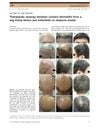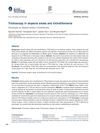 1 citations,
July 2023 in “Frontiers in Immunology”
1 citations,
July 2023 in “Frontiers in Immunology” Oxidative stress and immune dysfunction are linked to both Hashimoto's thyroiditis and polycystic ovary syndrome, with diet and specific treatments important for managing these conditions.
 1 citations,
June 2023 in “BMC Pediatrics”
1 citations,
June 2023 in “BMC Pediatrics” Most children recovered from COVID-19 in 4 weeks, but some experienced long-term symptoms, especially older kids.
 January 2025 in “Cellular & Molecular Biology Letters”
January 2025 in “Cellular & Molecular Biology Letters” Eicosanoids are crucial for skin health, and targeting their pathways may help treat skin conditions.
 December 2024 in “Archiv Euromedica”
December 2024 in “Archiv Euromedica” Trichoscopy is essential for diagnosing and treating autoimmune cicatricial alopecia early.
 December 2024 in “Advanced Composites and Hybrid Materials”
December 2024 in “Advanced Composites and Hybrid Materials” Electrospun 3D nanofibrous materials show promise for bone regeneration in orthopaedics.
 December 2024 in “IntechOpen eBooks”
December 2024 in “IntechOpen eBooks” Trichoscopy helps diagnose and track alopecia areata by examining specific hair and scalp markers.

Postpartum hair loss can reveal hidden hair loss conditions.
 51 citations,
December 2011 in “The Journal of Dermatology”
51 citations,
December 2011 in “The Journal of Dermatology” New treatments for severe hair loss often fail, but some patients see hair regrowth with specific therapies, and treatment should be tailored to the individual's situation.
 36 citations,
April 2016 in “British journal of dermatology/British journal of dermatology, Supplement”
36 citations,
April 2016 in “British journal of dermatology/British journal of dermatology, Supplement” A substance called VIP might protect hair follicles from being attacked by the immune system, and problems with VIP signaling could lead to hair loss in alopecia areata.
 23 citations,
January 2009 in “Veterinary Dermatology”
23 citations,
January 2009 in “Veterinary Dermatology” The hepatitis B vaccine did not cause hair loss in the tested mice.
 18 citations,
April 2013 in “PLOS ONE”
18 citations,
April 2013 in “PLOS ONE” Mice with autoimmune hair loss showed signs of heart problems.
 11 citations,
March 2021 in “Dermatology and therapy”
11 citations,
March 2021 in “Dermatology and therapy” Researchers created a new tool to measure the effects of alopecia areata from the patient's view, focusing on hair loss, daily life, and emotional health.
 8 citations,
October 2019 in “Immunological investigations”
8 citations,
October 2019 in “Immunological investigations” The AIRE gene variant rs2075876 is linked to a higher risk of alopecia areata in males.
 4 citations,
September 2018 in “The Journal of Dermatology”
4 citations,
September 2018 in “The Journal of Dermatology” A man's hair regrew from alopecia areata after using tofacitinib and experiencing contact dermatitis from a wig device.
 2 citations,
November 2018 in “Destaques Acadêmicos”
2 citations,
November 2018 in “Destaques Acadêmicos” Microneedling showed the most significant results for treating hair thinning in Androgenetic Alopecia.
 December 2023 in “Portuguese journal of dermatology and venereology”
December 2023 in “Portuguese journal of dermatology and venereology” Trichoscopy can reliably distinguish between alopecia areata and trichotillomania.
 April 2023 in “Medizinische Genetik”
April 2023 in “Medizinische Genetik” New gene discoveries have improved diagnosis and treatment for skin and hair disorders, but more research is needed to fully understand them.

Microneedling is an effective way to treat hair loss from androgenetic alopecia.
 June 2023 in “Brazilian Journal of Health Review”
June 2023 in “Brazilian Journal of Health Review” Common baldness is a hereditary condition that can be treated with medications or surgery to prevent progression and improve self-esteem.
 1 citations,
September 2020 in “Cochrane library (CD-ROM)”
1 citations,
September 2020 in “Cochrane library (CD-ROM)” The analysis aims to identify the most effective and safest treatments for alopecia areata.
 6 citations,
February 2003 in “Anais brasileiros de dermatologia/Anais Brasileiros de Dermatologia”
6 citations,
February 2003 in “Anais brasileiros de dermatologia/Anais Brasileiros de Dermatologia” Topical corticosteroid was not more effective than placebo for children's alopecia areata, and atopy did not change treatment results.

Topical corticosteroid treatment showed no significant difference from placebo in treating alopecia areata in children.
 80 citations,
April 2018 in “Trends in Molecular Medicine”
80 citations,
April 2018 in “Trends in Molecular Medicine” Lichen Planopilaris and Frontal Fibrosing Alopecia may help us understand hair follicle stem cell disorders and suggest new treatments.
 February 2024 in “Recima21”
February 2024 in “Recima21” Covid-19 can cause hair loss due to immune and psychological factors.
 February 2024 in “Oriental Journal of Chemistry/Oriental journal of chemistry”
February 2024 in “Oriental Journal of Chemistry/Oriental journal of chemistry” Eclipta alba shows promise for treating various health issues and needs more research.
 January 2019 in “Oncogen”
January 2019 in “Oncogen” Triple Hormonal Blockade (ADT3) can effectively manage prostate cancer but requires careful monitoring for heart risks.
 October 2023 in “Frontiers in Medicine”
October 2023 in “Frontiers in Medicine” Dupilumab helped a 4-year-old grow hair back after another treatment failed.
 October 2023 in “The Cochrane library”
October 2023 in “The Cochrane library” The medicine baricitinib was found to notably improve hair regrowth in alopecia areata, but more research is needed on its side effects and other treatments.



























